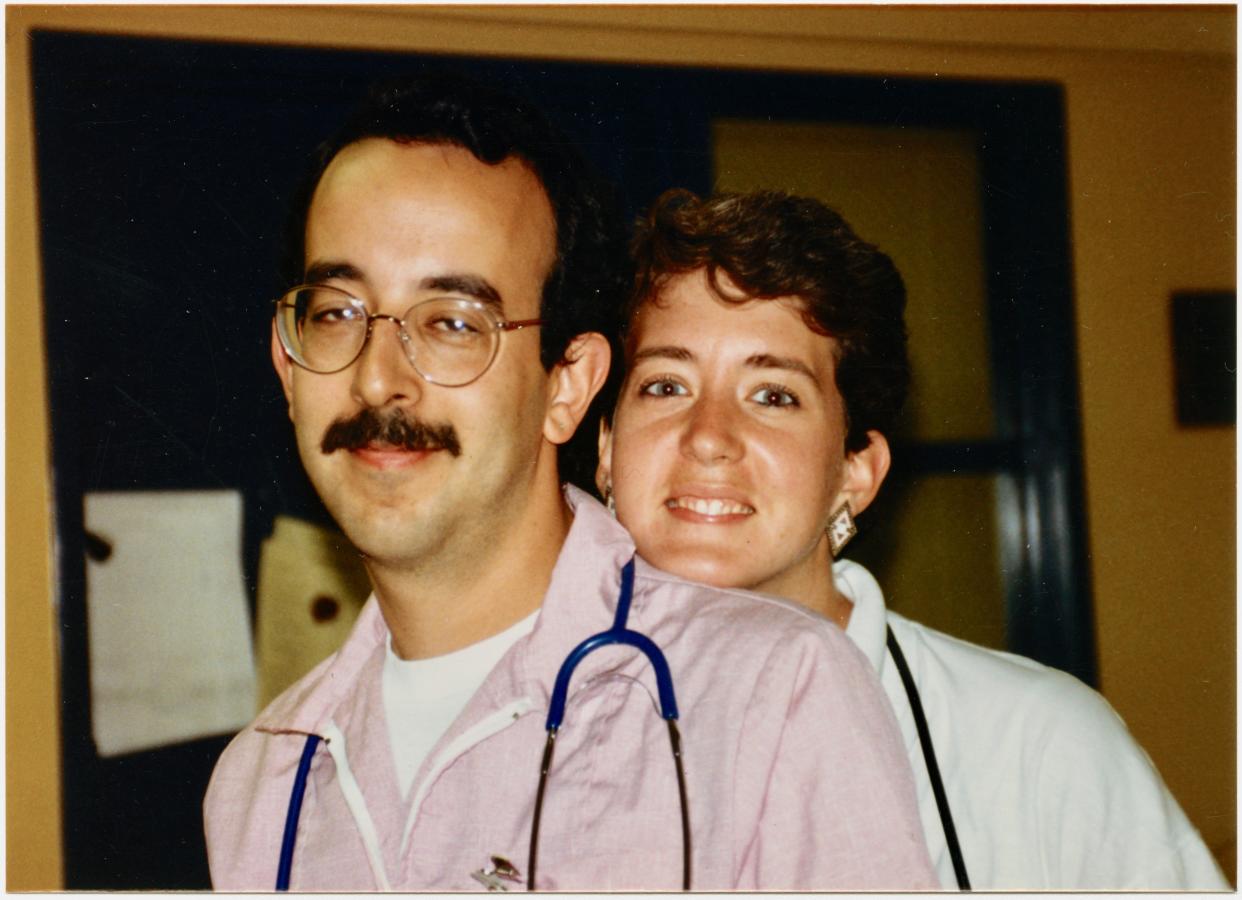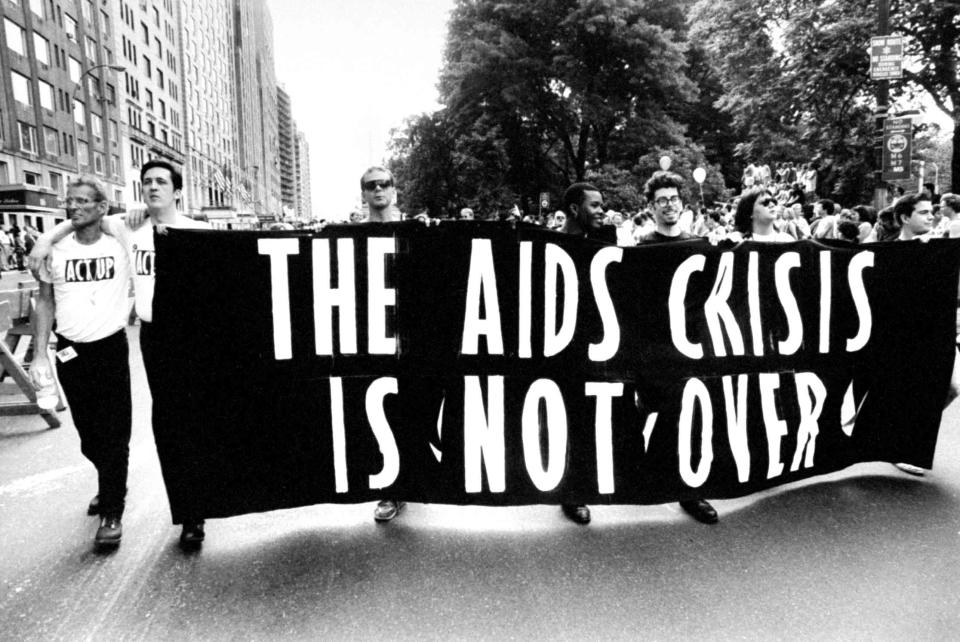'Screw you and all your fear and homophobia': Nurse reveals what it was like to work at San Francisco's first AIDS ward

When cases of a disease called AIDS started to spike among gay men in San Francisco in 1981, fear spread like wildfire. Restaurants refused to serve those who tested positive, hospitals turned them away, and bars banned them from entering.
Medical professionals who were willing to see AIDS patients often treated them inhumanely, donning the medical equivalent of a space suit, neglecting to serve them food, and leaving their bed linens soiled for days. For one group of nurses at San Francisco General Hospital, this treatment was unacceptable.
So in 1983, they petitioned to start what would become the very first dedicated-AIDS ward in America, San Francisco General’s Ward 5B. In a new documentary by RYOT, a Verizon Media company (which also owns Yahoo), titled 5B, the caregivers reflect on their decision to build a place where AIDS patients could not only live, but die, with dignity.
The ward was revolutionary — both in form and function. Inside, nurses openly held their patients hands, bathed them and fed them. They threw entertaining brunches to lift their spirits and birthday parties in their final days. They recognized their partners as family, and allowed them unrestricted access to hospital rooms. Most significantly, they showed compassion to a population that was reeling in pain.
It was not a position that came without risks. “People were like, ‘Well you’re probably going to get AIDS and you’re probably going to die,’” Cliff Morrison, the nurse who petitioned for the creation of the ward, says in the film. “I said, I might have some anxiety about this, but I’m more pissed off and angry than I am scared.”
With no clear understanding of the disease’s cause or how to slow its progression, the nurses were operating blind, and risking their own safety at work each day. One of the youngest nurses to take this courageous step was Mary Magee, a then-24-year-old who moved from New York City after learning about the ward. Ahead of the film’s nationwide release, Yahoo Lifestyle talks with Magee about what tools she used to keep going, and what she hopes young people do to stand up today.
Yahoo Lifestyle: Let’s start from the beginning, How did you end up working in 5B?
MM: Well, I was a very young nurse in New York City at the time, and I was starting to see these patients coming in with AIDS. There was a way in which we would have conversations that just cut through a whole lot of the politeness...I had been raised in a suburb outside of NYC and I was still a little bit of a sheltered suburban gal. But I visited a friend in San Francisco and...it was clearly coming forward as a leaders in AIDS care. I knew that there was this dedicated AIDS unit that was starting to get press attention and I was really drawn to it.
Yahoo Lifestyle: You started not long after it opened and worked the night shift. In the film, you mentioned that you were “allowed to love” your patients. What did you mean by that?
MM: Because we could not "fix" people's disease with AIDS, we couldn't cure them, there was really this emphasis on decreasing suffering. You used every tool you had, including the human person. There were people who didn't have their families; they had experienced a lot of discrimination. There was tons of fear-mongering and stigma in the press. And so one of the tools you used is just your own human presence and heart. When somebody is dying, you pull out a few stops that you may not if you're working in an ambulatory surgery department. You let yourself cry with people and be human with people and their loved ones.

Yahoo Lifestyle: Were you able to grasp, at the time, how monumental it was what you were doing?
MM: I don't know that we grasped how monumental it was. I think there was a feeling on the unit that what was monumental was this terrifying disease and this huge loss of life, and this government that essentially was looking the other way —this entrenched homophobia and stigma and fear. I think we thought our patients are up against these monumental odds and life challenges and so we want to be present with that. I know I mentioned at one point in the film we had a lot of f**k you feelings — and we did.
Yahoo Lifestyle: Can you elaborate on those f**k you feelings — what kind?
MM: Well, you were just constantly, constantly hearing about people that didn't want to go to restaurants because their waiter might have HIV, or might have AIDS, people at other hospitals who their partners weren't being allowed to visit because they weren't blood family. There were even cases in the hospital where the dietary person wouldn't even come in and bring the food. That didn't happen in our unit. There are a lot of unsung heroes that aren't necessarily in the film — the janitors, the dietary people — but you would just hear one thing after another so you would just kind of feel yourself being like, “Screw you and all your fear and homophobia, we're going to stand here with our patients.”
Yahoo Lifestyle: What do you hope that young people take away from this film?
MM: I would say the most salient thing that it is really important — to stand up for people. It's really helpful when you can do it with a team in solidarity, allies, people who support one another; [5B] reflected that. I think it's important to figure out honestly with yourself what risks you're willing to take to stand up for people and there's no judgment about what degree of risk you take, but you're willing to take some — even if it means speaking up against bias at a cocktail party. You do that.
Yahoo Lifestyle: What can people do to take that first step to stand up for people?

MM: I think it's really important that we all educate ourselves about what's happening. The truth is AIDS isn't over and neither is bias. On July 22, new Health and Human Service rules are supposed to go into effect that would allow health care workers to deny care to people based on religious beliefs. And it's expected that the targeted patients will be LGBTQ and women... That is already happening and now it's going to be a protected right under these new rules. So I just encourage everyone to pay attention to what's happening because when we know what's happening then we can make that choice about how we want to stand up.
Halle Berry, Jaime King and more celebs share their personal reactions to 5B:
Read more from Yahoo Lifestyle:
Man’s plan to hold Straight Pride Parade in Boston faces backlash, mockery: ‘This is tragically sad’
Trans teen Jazz Jennings makes inspiring valedictorian speech: ‘Follow your dreams’
Follow us on Instagram, Facebook, Twitter and Pinterest for nonstop inspiration delivered fresh to your feed, every day.
